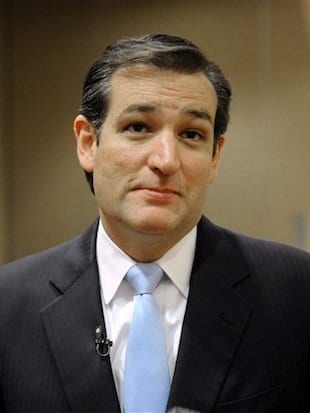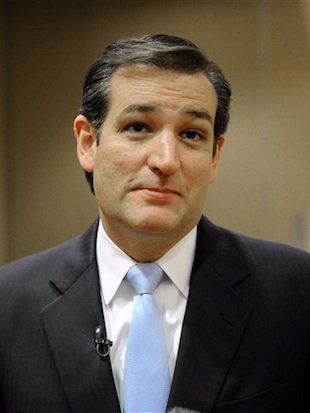Republican Texas Sen. Ted Cruz visited Iowa on Friday to speak at a decidedly anti-gay “Pastors’ Policy Briefing” — an appearance viewed as yet another sign Cruz plans to seek the Republican presidential nomination in 2016.
According to multiple reports, Cruz received a favorable response from the folks in Iowa, and several media outlets, including Politico and Salon, are now treating him as a legitimate contender.
Which should be a frightening prospect for the LGBT community.
During his campaign for Senate last year, Cruz repeatedly attacked another Republican candidate, former Dallas Mayor Tom Leppert, for appearing in the city’s gay Pride parade. During a candidate forum I attended at the Dallas Country Club, the moderator noted these attacks and asked Cruz whether he has something against gay people:
“I have something against gay marriage,” Cruz responded. “I don’t support gay marriage. I think there is an onslaught right now in this country to tear down traditional marriage, and I don’t think it’s right.”
Cruz, former solicitor general for the state of Texas, talked about how he helped Attorney General Greg Abbott block a gay couple from obtaining a divorce from their Vermont civil union in Beaumont in 2003. The moderator then asked Cruz whether he was suggesting that Leppert supports same-sex marriage.
“When the mayor of a city chooses twice to march in a parade celebrating gay Pride, that’s a statement, and it’s not a statement I agree with,” Cruz said.
In light of the recent anti-gay crackdown in Russia, which has included a ban on Pride celebrations, it’s hard not to wonder whether Cruz would support a similar law. But needless to say, Cruz’s anti-gay statements haven’t been limited to attacking Leppert’s appearances at Pride.
On his website during the Senate campaign, in addition to boasting about the Beaumont civil union case, Cruz touted a letter he wrote in support of the Defense of Marriage Act — as well as court briefs he filed defending the Boy Scouts’ ban on gays and military recruiters’ access to college campuses regardless of the anti-gay “don’t ask, don’t tell” policy.
And just a few short weeks ago, Cruz was one of the few Texas Republicans to condemn the Supreme Court’s decision to strike down DOMA.
“Today’s Supreme Court decisions on marriage are a regrettable overreach against the will of the people as expressed through large, bipartisan majorities in Congress and directly through referendum in California — a markedly blue state,” Cruz said in a statement posted on his website. “Nothing in the Constitution compelled this result, and, once again, the Court has chosen to substitute its own views of public policy for the democratically expressed will of the voters. The family is the fundamental building block of society, and I strongly support traditional marriage between one man and one woman. The voters of California made that same choice, until the courts improperly substituted their preferences for those of the people. Our Federalism allows different states to make different policy judgments based on the values and mores of their citizens. Federal courts should respect that diversity and uphold that popular sovereignty, not impose their own policy agenda.”
OK, so maybe Cruz wouldn’t try to ban gay Pride parades if he’s elected president. But if a state wanted to ban gay Pride, he might be OK with it. Our question is, in the name of consistency, would that same principle of federalism prompt Cruz to oppose a federal constitutional amendment banning same-sex marriage?
We’ve left a message with Cruz’s press folks trying to find out, so we’ll update if we hear back.
















